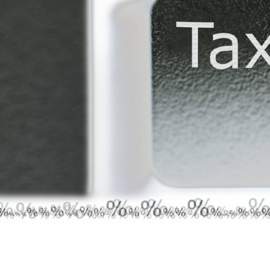
Kansas Tax

Individual Income Tax Forms
Form K-40 Kansas Individual Income Tax
Corporate Income Tax Forms
Form K-120 2011 Corporation Income Tax
Form K-120V 2011 Corporate Income Tax Voucher
Sales Tax Forms
Form ST-21 Sales and Use Tax Refund Application
Property Tax Forms
Form Schedule RNT Certification of Rent Paid 2011
Form PVD-SSHB2923 Application for Deferral of Real Property Taxes
Form Personal Property Assessment
Form K-40PT 2011 Property Tax Relief Claim for Low Income Seniors
Form DIS Certificate of Disability
Kansas State Tax
There are a number of taxes applicable to the state of Kansas, which includes sales tax and three income brackets for personal income taxation. Kansas state taxation is slightly below the national average and taxpayers pay roughly $3,911 in taxes per capita.
Kansas state sales tax – 6.3%, food and drugs exempt.
Kansas state personal income tax
- Three income brackets for single filings
o 3.5% for income below $15,000
o 6.25% for income between $15,000 and $30,000 (over 30k for couples)
o 6.45% for income over $30,000 (over 60k for couples)
- Tax returns are due on March 15, percentage penalties for late filings, up to 50% for a year delay
Kansas state excise taxes
Taxes assessed on vehicles, alcohol, tobacco, gasoline and are in addition to federal excise taxes.
- $.79 per package of 20, $.99 tax on cigarette packages of 25
- $2.50 tax per gallon of liquor
- $.18 on strong beer, $.30 on light wine, $.75 on fortified wine.
- $.24 a gallon on gasoline , $.26 on diesel
Kansas State marijuana taxes
- Processed - $3.50/gram
- Wet Plant - $.40/gram
- Dry Plant - $.90/gram
Only drug dealers pay these taxes. Anyone that produces, ships transports or imports 28 grams of marijuana in Kansas is a drug dealer.
Kansas inheritance tax
The current Kansas state ax on estates stands at .5% - 3% with an exemption of $1,000,000. Estates exceeding the exemption must file Form K-706 within 9 months of the death of the individual.
Kansas payroll taxes
State Disability Insurance – none
State Unemployment Insurance - .11% to 7.4%, wage base is $8,000. Employer contribution is 6% for construction, 4% for all others.
Exemptions
- Single - $2,250
- Married - $4,5000
- Dependents -$2,250
Military, civil service, state and local government in-state pensions are exempt. No state states on Social Security benefits for individuals making less than $75,000. VA benefits not taxed.
Corporate income tax - 4% plus 3.05% surcharge on income over $50,000 and 3% surcharge for income under $50,000.
Misc
Social Security, railroad retirement and life insurance benefits are not taxed under Kansas law. Gaming winnings from the lottery, casinos or horse racing are taxed.
Military personnel are taxed by federal income tax rules unless receiving some income in Kansas. Military income then factors into that tax determination.
Property tax is assessed at fair market value, apprised and tax collected at the county level. At least half of property taxes are due Dec 20 with tax assessments being sent around November.
Intangible tax returns must be filed for income exceeding $5 income on savings accounts, stocks, bonds and other financial tools. This form discloses the income and the bill is sent and assessed once the form is filed.
Individuals specified under Kansas income tax law include residents, nonresidents, part-year residents, military personnel, and native american indians. According to Kansas income tax distinctions, residents are individuals who reside within the state legally, regardless of their actual place of employment. As a Kansas resident for a least a year, you are required to file a state income tax return.
Qualifications for this include that you were originally required to file federal income tax returns as well as if your "adjusted" gross income within the state is that which surpasses your "standard deduction and exemption allowance" there.
Nonresidents are required to file Kansas income tax returns if they garner their income from anywhere within the confines of the state. In addition, if your employer had not imposed taxes upon you earnings, you will also be required by law to file a return despite the absence of income. You must also produce a letter from your employer, written under company letterhead, which presents legitimate proof of the mistake on their part.
This letter must include the earnings and withholding in relation to Kansas. In terms of part-year residents, they are classified as individuals who have only been a resident of the state for under that of a 12 months within a taxable year. In reference to this status, you will have the choice of filing a Kansas income tax return as either a resident or nonresident.
According to Kansas income tax law, as a member of the military, whether on active duty or as a reserve, your income is subject to taxation of whatever state you have placed you permanent residency within. It does not change even if you may have had stays in other areas as is the law for Kansas. Therefore, permanent residence within this state requires that you file Kansas income tax returns.
In addition, you must file Kansas income tax returns by way of Kansas tax forms if you had attained any monetary earnings from the state, regardless of residence elsewhere. Non-military spouses of these nonresident military personal may, however, be exempt from Kansas income tax.
In order for this to occur, they must prove that the only reason they are currently living within the state is due to their military spouse's stationing there. Native American Indians also present a population of interest within the state as they are exempt from state income tax when they are already exempt from federal income taxes. In addition, whatever income they had garnered from their reservation.
If you have issues in relation to the filing of income taxes, which have, therefore led you down a potentially serious road of trouble, you must familiarize yourself with the appeals process for the state of Kansas. Upon notification by and assessor, you will be presented with the option of communicating with a "problem resolution officer" in order to work through the matter.
Following failure to reach a resolution, a "notice of final assessment" will be set forth. If the individual is in disagreement with the notification, they must convey an appeal letter within 60 days calling for an informal hearing on their case, including their complaints. Afterward, the department will have their final decision within 270 days of the request, which then lead to the addition 30 days that the taxpayer has to file another appeal of the department's final decision.
NEXT: Kentucky State Tax





















